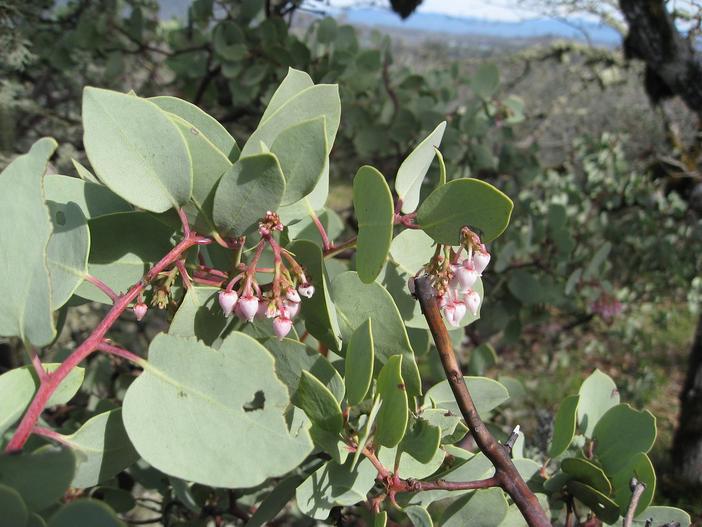Sticky Whiteleaf Manzanita
(Arctostaphylos viscida)
Sticky Whiteleaf Manzanita (Arctostaphylos viscida)
/
/

brewbooks
CC BY-SA 2.0
Image By:
brewbooks
Recorded By:
Copyright:
CC BY-SA 2.0
Copyright Notice:
Photo by: brewbooks | License Type: CC BY-SA 2.0 | License URL: https://creativecommons.org/licenses/by-sa/2.0/ | Uploader: brewbooks | Publisher: Flickr







































































































































































































Estimated Native Range
Summary
Arctostaphylos viscida, commonly known as Sticky Whiteleaf Manzanita, is an evergreen shrub or small tree native to the chaparral and pine forests of California, particularly thriving in the coastal ranges and the Sierra Nevada foothills. It can grow up to 5 meters (16 ft) tall, with a form that varies from rounded to irregular. The stems may be smooth or fuzzy, and are often glandular, exuding a sticky substance. The leaves are rounded to oval, sometimes slightly toothed or with hairs along the edges, and usually dull green on both surfaces, which can be sticky to the touch. The plant is particularly showy when in bloom, with densely packed inflorescences of urn-shaped white to pale pink flowers that attract pollinators. Following the flowering season, it produces shiny red or greenish-brown drupes between one half and one centimeter wide, which are a food source for wildlife. The seeds have a fire-dependent germination strategy, a common adaptation in chaparral ecosystems.
Sticky Whiteleaf Manzanita is valued for its drought tolerance and its ornamental qualities, including its attractive bark, which peels in thin sheets to reveal smooth, reddish or mahogany-colored wood beneath. It is used in native plant gardens, as a specimen plant, or for erosion control on slopes. This species requires minimal water once established and prefers well-drained soils, tolerating a range of soil types from sandy to loamy. It thrives in full sun to part shade. While generally low-maintenance, it can be susceptible to fungal diseases in poorly drained soils or when overwatered. It is also important to avoid disturbing the root zone, as the plant can be sensitive to root damage.CC BY-SA 4.0
Sticky Whiteleaf Manzanita is valued for its drought tolerance and its ornamental qualities, including its attractive bark, which peels in thin sheets to reveal smooth, reddish or mahogany-colored wood beneath. It is used in native plant gardens, as a specimen plant, or for erosion control on slopes. This species requires minimal water once established and prefers well-drained soils, tolerating a range of soil types from sandy to loamy. It thrives in full sun to part shade. While generally low-maintenance, it can be susceptible to fungal diseases in poorly drained soils or when overwatered. It is also important to avoid disturbing the root zone, as the plant can be sensitive to root damage.CC BY-SA 4.0
Plant Description
- Plant Type: Shrub
- Height: 8-16 feet
- Width: 3-12 feet
- Growth Rate: Moderate
- Flower Color: Pink, White
- Flowering Season: Spring, Winter
- Leaf Retention: Evergreen
Growth Requirements
- Sun: Full Sun, Part Shade
- Water: Low, Very Low
- Drainage: Slow, Medium, Fast
Common Uses
Bee Garden, Bird Garden, Butterfly Garden, Deer Resistant, Drought Tolerant, Hummingbird Garden, Low Maintenance, Rock Garden
Natural Habitat
Native to the chaparral and pine forests of California, particularly in the coastal ranges and the Sierra Nevada foothills
Other Names
Common Names: Whiteleaf Manzanita
Scientific Names: , Arctostaphylos viscida,
GBIF Accepted Name: Arctostaphylos viscida Parry